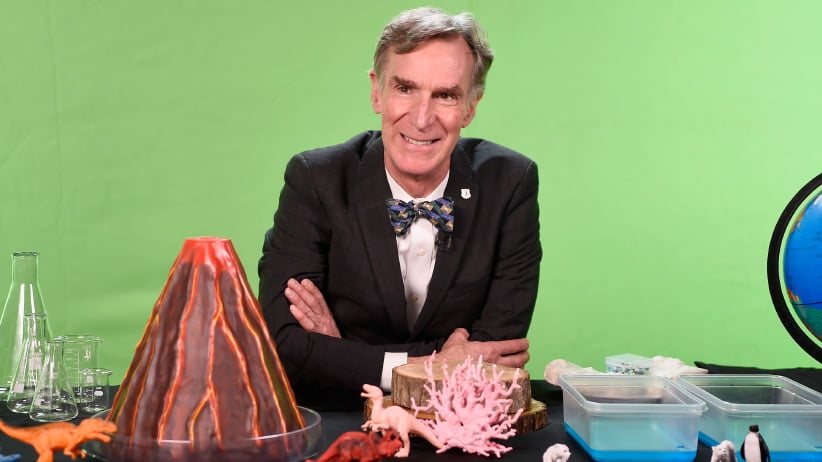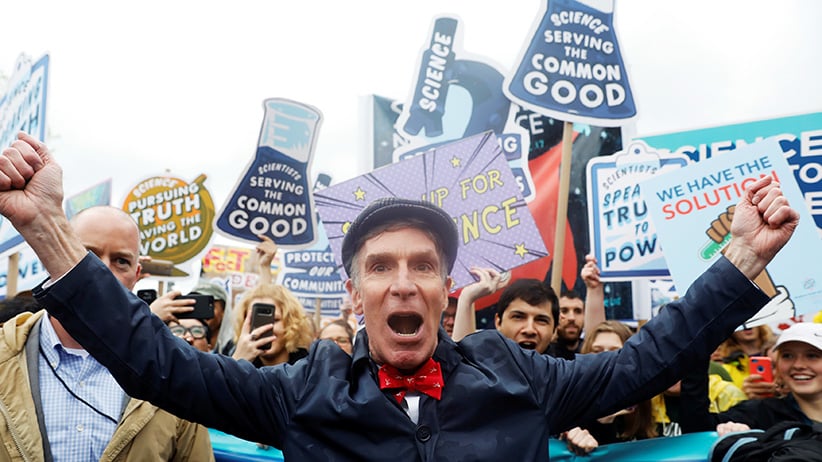Is Bill Nye a science guy—or is he wearing a science guise?
Maybe he won’t save the world. But with a new doc and Netflix show, the Science Guy is, at the very least, saving his career
Bill Nye hosts National Park Foundation ‘View-A-Thon’ at Mashable on November 29, 2016 in New York City. (Dave Kotinsky/Getty Images)
Share

About thirty minutes into David Alvarado and Jason Sussberg’s new documentary Bill Nye: Science Guy, which made its international premiere this week at Toronto’s Hot Docs film festival, a montage of interviewees express a shared suspicion: Bill Nye is dead.
For a generation coming of age in the mid-1990s, Nye was everywhere. In his trademark blue lab coat and bowtie, Bill Nye (“The Science Guy”) introduced kids watching his super-popular PBS show to the wild world of science, through zippily edited experiments, pop song parodies (like “AC/DC Charge” by Billy Ray Cyrcuits) and a welcome dose of comedy that enlivened the doldrums of elementary school science class. He was—at the risk of overstating it—the Michael Jordan of science.
So where did he go?
“It took me this long to find the right people to work with,” says Nye, who recently revived his Science Guy persona for his new Netflix talk show Bill Nye Saves The World. He rattles off a list of TV shows and documentaries he’s appeared in since the glory days of Bill Nye the Science Guy: BattleBots, The Eyes of Nye, 100 Greatest Inventions, and half a dozen more. He laments that these programs, worthy as they are, lacked the “pop” of the Science Guy show that made him a star.
“The other problem was that these shows weren’t extensions of me,” Nye says. “Anybody could have hosted these shows and they would have come out fine. Whether you like him or not, The Tonight Show with Jimmy Fallon has to be an extension of Jimmy Fallon. The Late Show with Stephen Colbert has to be an extension of Stephen Colbert. Chelsea Lately has to be an extension of Chelsea Handler, or it just won’t work.”

Bill Nye Saves the World has plenty of pop—and plenty of Bill Nye. Back in the bowtie and lab coat, tinkering around with beakers and burners in front of live studio audiences—comprised largely by 20- and 30-somethings for whom Nye served as a de facto substitute science teacher—and a suitably catchy, repetitive theme song (courtesy rapper/producer Tyler, The Creator, no less). For the Science Guy himself, Bill Nye Saves the World is the realization of a lifelong ambition. After graduating with a bachelor’s degree in mechanical engineering from Cornell University in 1977 and landing a lucrative engineering job with Boeing, Nye shifted gears, pursuing a career in comedy after winning a Steve Martin lookalike contest.
“I spent a lot of time trying to write comedy, trying to write jokes, performing in comedy sketches,” he recalls. “In my day we studied The Tonight Show with Johnny Carson. This was the grail, the big dream in the sky: to be Johnny Carson. And I mean, I’m there! I’m not Johnny Carson, but I’ve got my own talk show. Check me out, man!”
That could very well be the pitch for Bill Nye Saves the World: “The Tonight Show for pop science.” There’s Nye’s commingling of comedy and science, pre-taped segments, and panel discussions with experts on a given subject. Every inch of the lavishly designed sound stage feels like an extension of Nye. It’s like a straight-up sequel to the beloved Bill Nye: The Science Guy.
And that’s the problem. Nye still talks to his audience, who are now fully matured adults, as if they’re wide-eyed little kids watching PBS. As its host fist-bumps his correspondents, screams “Woohoo!” at one or another experiment, and creaks his way through dorky jokes, Bill Nye Saves the World is pandering to the point of feeling embarrassing.
It also borders on irresponsible. Take episode four, “More Food, Less Hype,” which discusses genetically modified organisms (GMOs). Pulling off his best Dr. Frankenstein impression, Nye paints “this image of mad scientists mixing tarantula genes into eggplants!” He then dispatches a correspondent to a farmer’s market, in an obviously Kimmel-ish turn, to expose the ignorance of consumers and organic food activists when it comes to GMOs.
It’s a classic example of building a straw man: reducing an argument to broad caricature in order to easily refute it. While some people may find genetically modified foods just straight-up “icky,” many of the larger concerns have less to do with the genetics and more to do with the economics, like how gargantuan agrochemical corporations like Monsanto exploit biological patents to exert a stranglehold on family farmers and other croppers not using Monsanto-branded seeds. It’s not necessarily about the bioethics of breeding more resilient soybean crops or growing larger strawberries; it’s about the corporate ethics of GMO giants rigging (or splicing) the game to bolster their bottom lines.
It may be easy to excuse such lapses in argumentation. After all, Bill Nye is the Science Guy, not the Corporate Ethics Guy. And given how frequently Nye is attacked for his lack of actual scientific credentials—Alvarado and Sussberg’s new doc digs into this rather deeply, even showing archival footage of Sarah Palin undermining Nye’s scientific bona fides—it may be understandable that he wants to stick to the science, if only to bolster that perceived lack of credibility.
“If Sarah Palin were to say, ‘I think Bill Nye is a first-class mechanical engineer,’ that would be troubling in a whole different way,” Nye says, laughing. “An endorsement from Sarah Palin is not a good thing.” Nye has been hearing these criticisms for so long that they roll off him like water off a duck’s back. Despite his prominence in the scientific community (or at least the pop scientific community), he’s less a “real scientist” than an accessible figurehead—a kind of science mascot.
But the documentary levels an even harsher criticism at Nye—one he takes more seriously. It’s the accusation that his prominence, his persona, his whole Science Guy shtick, is a play for fame, the end-result of a wannabe comedian realizing his aspirations of stardom. “It made me feel bad,” says Nye of the claim that he’s only in it for the fame. “When you get laughs, it’s very exciting, as a comedian. When you see a student’s eyes light up, as a teacher, that’s also very exciting. When you don’t feel well, and you don’t want to perform, too bad. That’s the way it goes.”
Still, he barely allows himself a moment to be ruffled by the apparent arraignment of his sincerity. “Yes!” he screams, through the phone, fully alive and unembarrassed. “I love being on television! Yes! I’m a performer! Yes! That’s me! The show must go on!”
For Nye, science and superstardom seem one and the same. Even when his new show exhibits distasteful cajoling of its Millennial audience, or a lack of genuine scientific rigour (or indeed, a sense that he is actively shilling for Monsanto), it becomes difficult to blame, let alone dislike, Bill Nye. After all, he never claimed to be a real scientist. Only a Science Guy.